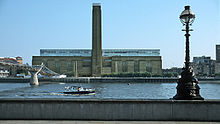Tourism in England
As of March 2021[update], a 10-day quarantine period applies to people entering England from a number of "red list" countries.
The United Kingdom's bus services offers numerous, frequent and reliable transport around most of the larger towns and cities.
Great Britain's extensive rail network is used to travel between cities significantly more than aeroplanes, with a 2015 survey finding that only 1% of international visitors flew domestically after arrival.
[15] The same VisitBritain report also discussed the effects of the pandemic on domestic within the UK in 2020, citing a significant reduction in spending, for an estimated decline of 62% over the previous year.
[16] A report published in March 2021 by the Fraser of Allander Institute indicated that "tourism and hospitality suffered notable losses from the pandemic" and provided detailed specifics for both domestic and international visits.
"There's still not much to do in the UK right now ... although this lockdown is now being eased some restrictions will likely be in place until the summer", the report predicted, with June being the most likely time for tourism from other countries to begin a rebound.
[21] The feasibility of the plan became less certain as of 8 April 2021 when sources in the European Union stated on that a "third wave of the pandemic [was sweeping] the continent"; the B117 variant was of particular concern.
[23] Two days earlier, PM Boris Johnson had made it clear that "We don't want to see the virus being reimported into this country from abroad".



